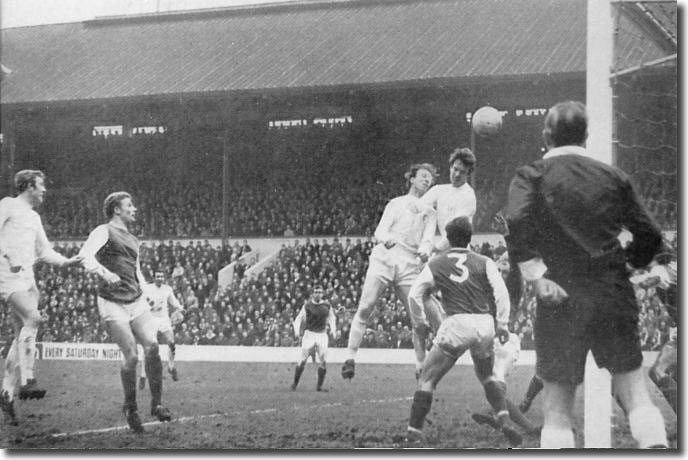 Part
1 - Going for the one - Results and table
Part
1 - Going for the one - Results and table
As 1969 dawned, Leeds United were making their strongest challenge yet
for the league title. Their first match of the year was an FA Cup third
round tie at Sheffield Wednesday and an impressive run of results in November
and December made them hot favourites for the trophy.
United were without Johnny Giles and Terry Cooper, but otherwise they
were at full strength: Sprake; Reaney, Charlton, Hunter, Madeley; O'Grady,
Bremner, Bates, Gray; Lorimer, Jones.
They opened aggressively in front of a 52,000 crowd and won a penalty
after 19 minutes. Referee Jim Finney waved play on when Eddie Gray rode
a foul tackle and the winger shimmied his way on through a packed defence.
He found Mike O'Grady on the penalty
spot, but full-back Don Megson brought the forward down before he could
shoot. Finney awarded the penalty, which Peter Lorimer coolly converted.
United were in the ascendancy and Paul Madeley headed home from a corner.
The referee initially awarded the goal, but after consulting a linesman
gave a foul for pushing. O'Grady, Lorimer and Mick Jones all came close
to increasing the lead, but Wednesday were level by the break.
Centre-forward John Ritchie picked up a long clearance, swerved past
Jack Charlton and hit the ball
on the run from outside the box. Gary Sprake had come out to narrow the
angle and watched with horror as the shot found the corner of the net,
saying later, 'I simply misjudged Ritchie's shot, thinking it was running
wide.'
There were no further goals and a replay was required. United were still
without Giles and Cooper, and lost O'Grady on the day of the game with
a strained calf muscle. Albert Johanneson was called up for only his second
start of the season.
Wednesday began confidently, but it was United who opened the scoring
in the eighth minute. Lorimer's free kick was cleared by goalkeeper Peter
Springett, only for Johanneson to make up for his months out with an instant
shot that pierced the crowded area to find the net.
Leeds had no chance to capitalise as Wednesday forced them back with
Peter Eustace and Jim McCalliog controlling midfield. Sprake saved at
the feet of Ritchie and Eustace's tremendous drive struck the bar, bouncing
down on the line and clear. Eustace then lifted an up and under into United's
goal area which troubled Sprake, though he cleared at the second attempt.
Sheffield would not be denied and equalised in the 36th minute. Sprake
and Ritchie both missed a cross from the right, and Brian Woodall caught
the ball on the byline. His clever chip looped over Sprake's head and
in off the post. The young reserve winger, only playing because of injury,
added a second goal after three minutes of the second half.
United rallied and Charlton was left in the clear with Wednesday appealing
for offside but Springett made a point blank save. Then Jones was high
and wide from a Johanneson cross
before crashing a second effort against the bar.
Wednesday exploited the space left by all out Leeds attack and Ritchie
struck a third, decisive goal with five minutes left to end United's interest
in the trophy.
They had the chance to make amends almost immediately, facing Manchester
United in a stern test of their championship credentials. All four injured
Leeds players had recovered, with Giles, O'Grady and Bremner in the side
and Cooper on the bench.
Phil Brown in the Yorkshire Evening Post: 'The needle in this
cracking match 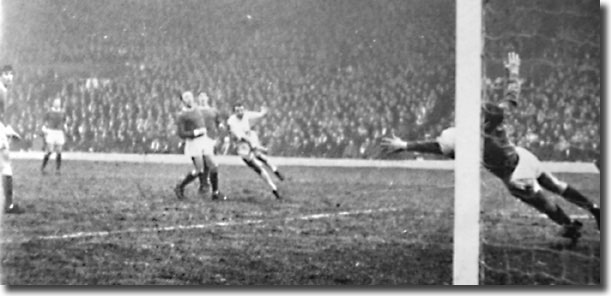 showed
right from the start ... Crerand, Manchester United's wing-half, was booked
for consecutive trips on O'Grady. The sides shared 33 fouls in the match,
nine above the average.
showed
right from the start ... Crerand, Manchester United's wing-half, was booked
for consecutive trips on O'Grady. The sides shared 33 fouls in the match,
nine above the average.
'Manchester claim they were robbed of a point by the denial of Best's
free kick goal. The referee, Mr W J Gow of Swindon, after the match told
the press the goal was invalid because the kick was an indirect one ...
Players on both sides say that they thought the kick was direct, including
Sprake ... Best's cunningly planted slow chip, when a Bobby Charlton blast
was expected, found him and others flat footed. All very contentious,
but Leeds deserved both points, if only just.'
O'Grady scored a cracking winner after 75 minutes. Giles chipped the
full-back to find the winger, who made it 2-1 with a first time piledriver.
Eric Todd in The Guardian: 'Leeds played much better than they
had done in their Cup game against Sheffield Wednesday, although there
still was too much dithering at the back under pressure. Jones again was
indefatigable in attack, and Hunter's strength and intelligence saved
Leeds more than once.'
The match was marred by crowd trouble and more than 50 spectators needed
treatment after missiles were thrown. 2,000 fans had been locked out and
many had climbed the advertising hoardings at the Scratching Shed end
to get in. Some claimed that problems with the new stand made matters
worse.
At the annual general meeting a couple of days later, chairman Percy
Woodward, who had been in the stand, claimed, 'There was no bottle throwing
and no fighting. The police were not fighting with the crowd, they were
stopping the crowd getting on to the playing area ... I saw an element
of Manchester supporters wanting to get out of Spion Kop when their side
had been defeated. They surged forward, but there was no question of fighting.'
On a happier note director Sidney Simon reported that the £135,000 liability
shown in the balance sheet against the new stand had been paid off.
United directors later announced that they had agreed with the local
authorities to reduce Elland Road's capacity from 52,000 to 48,000. Two
years before there had been ugly scenes in an FA
Cup replay against Sunderland when a record crowd of 57,892 had been in
attendance. Chairman Percy Woodward said: 'We are re-estimating all
our various sections and when necessary will take steps to close them
as our crowd indicator shows them to be filling up. It is a big relief
to settle this worrying question. No club wants its crowd to be uncomfortable.
Our long term plan of improvements to be done in stages should make things
a lot better for everybody.'
Woodward also revealed that United would be going ahead 'some time in
the next 12 months or so' with the building of an extension of the West
Stand to fill the gap between it and Spion Kop. 'It should give us over
2,000 more seats, which will financially compensate for the loss incurred
by the reduction of the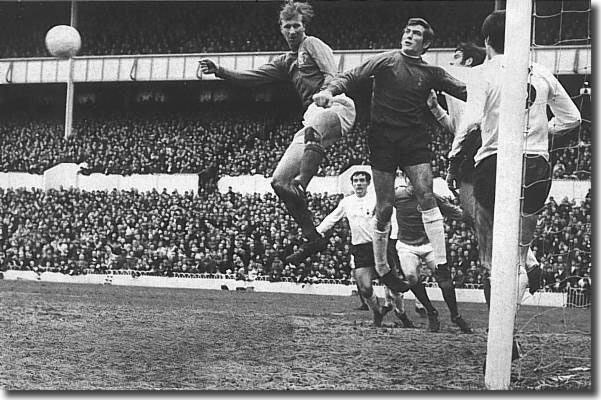 ground limit. It will also take care of the reduction in numbers we are
finding ourselves experiencing on Spion Kop. The old Kop used to take
about 19,000 when full and we had estimated for the new Kop to take nearly
17,000 - but we find that in practice it is full with 14,000 plus.'
ground limit. It will also take care of the reduction in numbers we are
finding ourselves experiencing on Spion Kop. The old Kop used to take
about 19,000 when full and we had estimated for the new Kop to take nearly
17,000 - but we find that in practice it is full with 14,000 plus.'
back to top
On January 18 United won a point in a hard fought goalless draw at White
Hart Lane, the result overshadowed by the leg break suffered by Spurs
full-back Joe Kinnear.
Leeds had another vital game in London the following Friday, facing bottom
club Queens Park Rangers in a fixture brought forward from Good Friday.
Don Revie later identified the match
as the turning point of the season. 'I am baffled that Rangers are not
near the top, instead of at the bottom. We could have lost 4 or 5-1. That
little bit of luck had swayed in our favour that night.'
The Londoners needed a point to get off the foot of the table, but nearly
got both, hammering United from the start. They almost took a shock lead
in the first minute. Roger Morgan's free kick beat Gary Sprake, but Jack
Charlton had it covered. Apparently thinking it was going wide, he allowed
it to drop over his head. The ball struck the post, sparing United embarrassment.
It was United, though, who took the lead a minute later. Madeley brought
the ball through from half way and got in a shot. It came back off the
keeper and Jones fired home from around 12 yards.
Rangers were quickly back at the visitors, and Leeds survived a penalty
appeal in the first half. Just after the interval QPR were successful
with another appeal for a spot kick but Sprake dived to his right to save
Keetch's effort.
United brought Belfitt on for the
injured Giles as Rangers pushed yet harder. Rodney Marsh was having an
inspired game and he and Mick Leach both came close to an equaliser before
Frank Clarke missed a sitter. Sprake was then lucky to grab a fine glancing
header by Clarke on the line. Shots continued to rain in on the United
goal but somehow they survived to take home both points.
Giles had torn a thigh muscle and would be out of action for a fortnight.
He was not missed when United thrashed struggling Coventry 3-0 at Elland
Road on 1 February. The scoreline flattered them, but they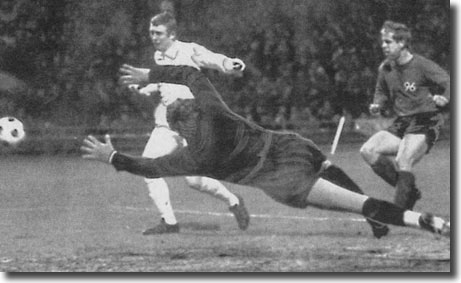 deserved the points.
deserved the points.
The schemer was still missing, along with Madeley, when United flew out
to Germany for the formality of their Fairs Cup-tie against Hanover. Leeds
had won the first leg 5-1 and were soon in an even stronger position.
In the fifth minute O'Grady made a lot of ground down the right before
shooting from the edge of the area. The keeper spilled the ball and Belfitt
followed up to score. After 16 minutes it was 2-0 when Jones capitalised
on another goalkeeping error.
That goal finished the game as a contest, but things grew surprisingly
heated over the final 21 minutes. Bremner and Breuer clashed and referee
Dorpmans of Holland spoke to both men. Things got even rougher and five
minutes later Cooper was sent off when substitute Wottka made the most
of a tackle by the left-back.
Cooper: 'I went for the ball and got it and this fellow threw himself
over my legs. I was absolutely flabbergasted.'
Three minutes from the end, Heynckes got a consolation goal for the Germans.
Revie said after the game: 'These are things you have got to live with
in Europe. Obviously any team plays that bit harder when they meet the
holders in any competition. It is getting to be a regular thing in important
games. I thought we played exceptionally well and Hanover were brutal.
It was a pity they had to play the way they did.'
United had the weekend off, with the FA Cup fifth round taking precedence,
but the snow and ice that saw all but four of the 38 games in England
postponed brought them an unexpected bonus. They were able to bring forward
their Easter Monday fixture against Ipswich to February 12, giving them
the chance to overtake Liverpool.
Don Revie: 'We must get these matches in when we can, for you never know
what the situation will be near the end of the season. We cannot afford
to be faced with a backlog of fixtures, for we want a smooth run in.'
The weather had a major influence on events that frostbitten winter and
United pulled out all the stops to keep their pitch playable. With temperatures
rarely getting above freezing, the club adopted effective, if primitive,
methods, covering the surface with tons of straw and then using braziers
to thaw out the ground. The tactics worked admirably, keeping Leeds active
while others were left kicking their heels. The Ipswich game was one of
those that benefited from the approach.
It was played in a snowstorm with the sleet making the conditions steadily
worse. United took the lead after 24 minutes. An Ipswich defender fouled
O'Grady as he raced down the right flank and Bremner fired the free kick
into the heart of the penalty box. Charlton got above three defenders
to nod the ball goalwards and Belfitt was on 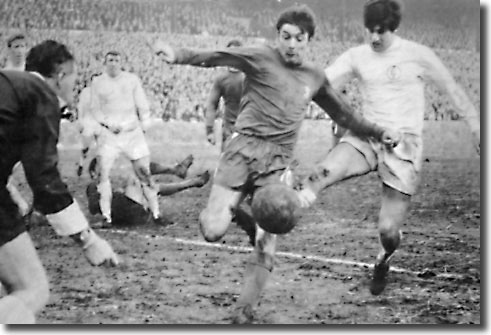 hand
to head it home.
hand
to head it home.
The goal gave Leeds the impetus they needed. Giles was in dominant form
and sent Cooper clear on the left to send a shot crashing against a post.
Jones laid on three chances for team mates and O'Grady had two efforts
saved. In the final quarter they had what seemed a good penalty appeal
rejected, but finally got the second goal they deserved. From their 17th
corner of the evening, keeper Best spilled the ball near the penalty spot.
Jones reacted instantly to fire past the defenders stationed on the line.
The 2-0 victory was enough to take United a point clear of Liverpool,
both clubs having played 29 games.
In the weekend fixtures, Liverpool looked to have the easier option,
at home to a Nottingham Forest side languishing in 20th, while United
hosted seventh-placed Chelsea.
Leeds had to ask for special dispensation for a 3.15 kick off to allow
their pitch clearing efforts time to succeed, and so they were aware before
the off that Forest had taken a fifth-minute lead at Anfield. They also
got the news that Barry Lyons had made it 2-0 in the 62nd minute and were
thus content to defend a single goal lead against Chelsea (in the 58th
minute from Lorimer).
According to The Guardian's Eric Todd. 'Forest proved themselves
to be the more intelligent, imaginative and adaptable side, and long before
the end the only relevant issue was the margin of Forest's inevitable
victory.'
Don Revie reflected in his column for the Evening Post: 'Liverpool
must be the team I fear most because of their remarkable consistency and
ability to play well under extreme pressure. This latter attribute can
only be attained through experience and I have had sufficient evidence
this season to feel confident that Leeds United now possess this quality.
It was particularly evident when we beat Chelsea ... They pulled back
nine men into their penalty area, and covered each other so well that
we were unable to break through in the first half. One could sense the
tension building up in the United players as they battled to overcome
the problem. The most encouraging feature was that they did not allow
this tension to interfere with the normal tempo of their game. They continued
to attack patiently and skilfully, and reaped the reward when Peter Lorimer
scored the winning goal. In previous years, we would probably have panicked
if we had failed to score earlier on, and fallen into the trap of hammering
high balls into the Chelsea goalmouth.'
Leeds' trip to Hillsborough to meet Sheffield Wednesday on 22 February
was postponed due to a frozen pitch and Liverpool had the chance to close
the gap with a match at West Ham. The Hammers took a 33rd-minute lead
through Johnny Sissons, but Roger Hunt headed a second half equaliser
to rescue a point.
The following Tuesday, United played their game in hand, away to Forest,
and gained an emphatic victory. David Lacey in The Guardian: 'Last
night there seldom seemed any other likely outcome than a victory for
Leeds. So often they were two situations ahead of Nottingham, who slogged
away willingly enough ... but lacked Leeds' pace and power, not to mention
their organisation. While Nottingham - inspired by a sense of occasion
and roared on by their largest crowd of the season - opened with dash
and verve, Leeds, as tight at the back as ever, quietly exploited their
opponents' weaknesses.'
United opened the scoring five minutes before the break. Cooper lofted
over a long, high centre from the left which Jones met at the far post.
His header beat the keeper but Baxter managed to 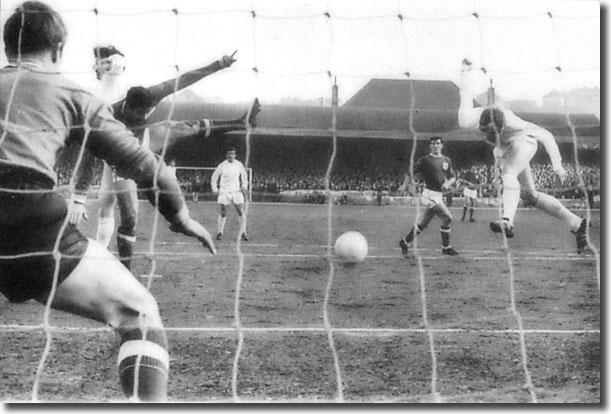 clear
it off the line. The linesman insisted that it had been over the line
and a goal was awarded.
clear
it off the line. The linesman insisted that it had been over the line
and a goal was awarded.
back to top
Leeds controlled the second half and continued to attack. It looked like
they would have to be content with their single goal but Lorimer made
it 2-0 a minute from time. He looked offside when he collected the ball
35 yards out, but there was no whistle and he raced on unchallenged to
score.
A four-point lead over Liverpool with eleven games remaining was a heartening
advantage. 1 March saw the Reds engaged in the FA Cup at Leicester, giving
United the chance to enhance their advantage with a match against Southampton
at Elland Road. Perhaps it was nerves, but Leeds gave a scratchy, woeful
performance. In contrast Southampton played with verve and confidence
and twice took the lead.
Just as disappointing was the attendance. Don Revie was apoplectic as
he spoke to Phil Brown of the Yorkshire Evening Post afterwards.
'What on earth do they want? Surely we could have had 40,000 - there are
over 2,000,000 people within 15 miles of the ground. If we lost three
matches in a row I don't think we would get 25,000, and if ever we got
a real slump I can see us having to sell players to live. Here we are,
top of the Football League, having lost only two matches out of 32, and
only 33,000 turn up to watch us play a side sixth in the table.'
Brown reported, 'On the financial aspect it has to be remembered that
United require a 36,000 average from their 21 home League matches to pay
their way. Their big profits of recent seasons have been and are wanted
for colossal ground development costs ... United have played to fewer
than that economic 36,000 ten times in 18 games so far.
'The result at Elland Road carried more comfort for Leeds United than
anything else ... United were thoroughly shaken by Southampton, who led
twice and who scored two, well, proper goals, compared with United's somewhat
scrambled assortment of a penalty by Giles, an own goal by Kirkup and
one by Jones off a rebound from a Giles shot. Much of the incisive direct
attack and smoothly working defence which had marked United's play at
Nottingham midweek was missing. It was as well that United's famous will
to win was not. Bremner, with a sterling game and often inadequate support,
saw to that by word and deed.'
Revie had calmed down by the time of the press conference prior to the
Fairs Cup clash against Ujpest Dozsa. He recalled how well the Hungarians
had played when the sides met in Budapest three years before: 'Ujpest
were unlucky not to be six goals up at half time, and that sort of football
sticks in the memory ... We will attack right from the off on Wednesday
night. I think we need three or four goals against this side to go to
Hungary for the second leg.'
Sadly, on what should have been another great European night at Elland
Road, there was only grim disappointment. United were beaten by an outstanding
team playing a classic European game of counter attack.
Barry Foster in the Yorkshire Post: 'There was very little between
the two fine sides. Leeds ... relied on open football while Ujpest depended
on chances from breakaways. Leeds' one period when they were clearly on
top in the first half lasted not more than five minutes. In the second
half their non stop aggression faded after the goal. Leeds were awarded
a penalty after Nosko appeared to handle Gray's cross in 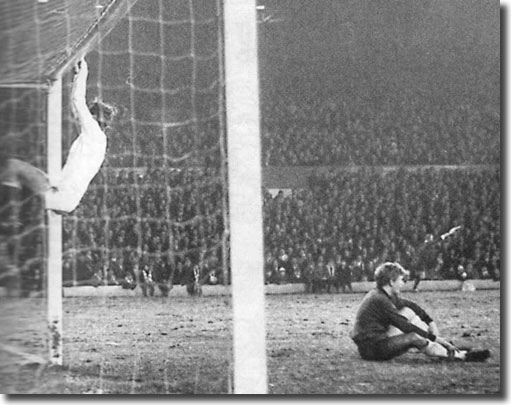 the
penalty area. Giles hit a good shot to the right of the goalkeeper, but
a fine save meant the Leeds schemer had missed - only his fourth penalty
in many attempts for the club.
the
penalty area. Giles hit a good shot to the right of the goalkeeper, but
a fine save meant the Leeds schemer had missed - only his fourth penalty
in many attempts for the club.
'Charlton and Bremner did their share to try and force a goal but 19
minutes from the end Bene hit a short ball to Antal Dunai and with hardly
a glance at the goal, 25 yards away, Hungary's leading scorer hooked a
powerful shot into the top right hand corner of the net.'
All this time, Liverpool's championship challenge had been on hold. Their
last league game had been on 22 February at West Ham and they saw their
home game with Arsenal on 8 March postponed because the visitors had eight
men sick. United thus travelled to relegation-threatened Stoke City with
the chance of increasing their advantage to eight points.
In 1968 Stoke had beaten Leeds 3-2 in an end of season tussle with United
chasing the championship, but there was to be no repeat performance. City
were only allowed to get as far as the United penalty area three times
in the first half as the visitors raced into a three-goal lead. Mick Jones
headed the first after 11 minutes. Five minutes later Bremner lashed home
a 25-yard shot. The skipper added a third in the 34th minute, sidefooting
home from Jones' header.
Stoke rallied a little in the second half and Burrows pulled one goal
back from the penalty spot on the hour after Reaney had blocked Mahoney's
shot with his hands.
There was never a danger of a fightback and O'Grady quickly restored
United's three-goal lead, netting from 14 yards after keeper Farmer had
blocked Gray's shot. O'Grady added a fifth in the 76th minute from outside
the box to wrap up an emphatic victory.
Leeds had been rampant and could easily have scored eight, so dominant
were they. England manager Sir Alf Ramsey recognised the performance by
selecting Charlton, Cooper and O'Grady for England's international against
France a few days later. Reaney and Hunter were non playing subs as England
won 5-0, their best victory for more than two years. Cooper and O'Grady
had outstanding matches, with the winger opening the scoring from 14 yards
and playing superbly on his return to international football after seven
years. He looked like he had secured a permanent berth in the side, but
perversely Ramsey dropped him and he never got near the squad again.
United's game on Saturday, 15 March, at home to Forest, was off due to
snow, giving Liverpool the chance to close the eight-point gap, which
they duly did with a 2-0 victory at Sunderland. There was a week to go
to the big showdown, with Leeds due at Anfield on 22 March and a huge
expectancy in the air.
Before that, though, United faced Ujpest in the Fairs Cup and flew out
to Budapest 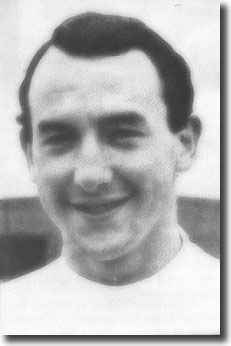 without
Reaney, Charlton and O'Grady, all in bed with flu. Hunter also had a high
temperature, although he travelled and was expected to play. The manager
called up reserves Terry Yorath and Jimmy Lumsden as cover.
without
Reaney, Charlton and O'Grady, all in bed with flu. Hunter also had a high
temperature, although he travelled and was expected to play. The manager
called up reserves Terry Yorath and Jimmy Lumsden as cover.
Don Revie: 'Whether these illnesses have anything to do with Astle being
ill last week when the lads were with the England party or whether it
is connected with an injection they received I just do not know. If we
had six, seven or eight down, we would ask the Fairs Cup Committee for
a postponement, but if we do not lose any more players we will play. With
four outstanding League fixtures still to fit in, we can do without another
postponement.'
There were further scares when Bremner, Madeley, Cooper, Jones and Hunter
were rushed off to bed with high temperatures on arrival in Budapest.
In the end all five played (Bremner at full-back) but Ujpest won 2-0 to
end United's Fairs Cup hopes.
Leeds held out until the 63rd minute when Solymosi scored from a penalty
after Madeley had fouled Bene, who had a wonderful game. The Hungarian
international added a second himself in the 75th minute after a solo run
through the United defence.
Don Revie: 'We held Ujpest well the first half-hour. Then they became
a little panicky. It would have been a different story if that Giles shot
earlier in the second half had gone in. With a full team out I reckon
we would have won.'
Back in England, Liverpool's game at Newcastle had been postponed because
of snow and water on the pitch and manager Bill Shankly was beside himself
with frustration at the lack of action. His mood was soon even darker.
As the United party flew back from Hungary, assistant manager Maurice
Lindley contacted the Football League to ask for the Anfield showdown
between the two clubs to be postponed. Leeds had ten first teamers unavailable
through illness or injury. The League had little option other than to
accede to the request but the postponement was kind to United.
The next game for both clubs came on 29 March, with Liverpool away to
QPR and Leeds travelling to Wolverhampton. Looking match rusty after their
lay off, United were slow off the mark and had to be content with a goalless
draw while Liverpool shaved a point off the lead with a 2-1 win in London.
On Monday 31 March Liverpool faced Arsenal in a rearranged game. While
the Gunners were eight points back on Leeds, they had not quite given
up hope on the title and offered Liverpool a stern test. The surface was
treacherous under falling snow and the players were never certain of their
footing. Just as Liverpool seemed to be getting control of the game, Jimmy
Robertson gave Arsenal the lead two minutes before the break. Liverpool
equalised from a penalty at the start of the second half and there were
no more goals.
The result narrowed United's advantage to four points, but 13 points
from their eight remaining matches would be 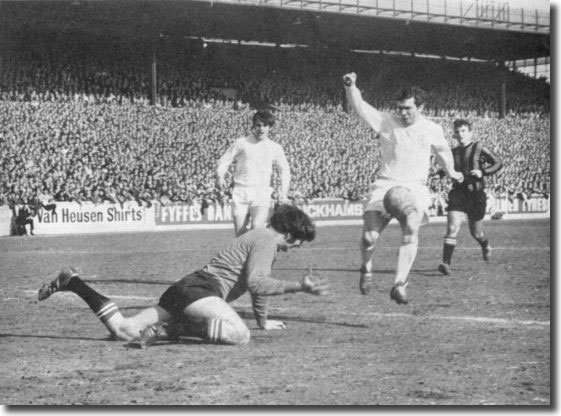 enough
for Leeds. They earned the first of those the following night in a goalless
draw at Sheffield Wednesday.
enough
for Leeds. They earned the first of those the following night in a goalless
draw at Sheffield Wednesday.
back to top
Saturday 5 April brought the next action for the two clubs, both at home.
Leeds entertained reigning champions Manchester City, while Liverpool
hosted Wolves.
By now, points were all that mattered, as Paul Fitzpatrick reported for
The Guardian: 'Looking at Liverpool on Saturday was about as inspiring
as watching a concrete mixer at work. But at this late stage of the scramble
for the First Division championship, the acquisition of points, not the
manner in which they are secured, is all important, and Liverpool, by
virtue of their untidy and unconvincing win 1-0 over Wolverhampton Wanderers
at Anfield, will give Leeds reason to remember that there are still two
runners in the race.'
United were little better and achieved an identical result. Eric Todd
in The Guardian: 'Leeds refused several chances which they might
not have scorned in more normal circumstances. Their two appeals for a
penalty suggested doubt in their ability to score by conventional methods.
Gray and Lorimer were profligacy gone mad, and poor Jones had as much
support as the average working man's application for a pay rise. Giles
and Bremner wove beautiful patterns all over the field, but the end product
… Oh dear! Not that Leeds were in danger of conceding a goal ... let alone
of being defeated, but the time has arrived for them to cast away their
defensive image and to attack with the enthusiasm and freedom they have
shown us far too rarely.'
Leeds got the only goal of the game after 63 minutes. Cooper beat Book
to the ball, made ground and got in a shot. Corrigan could only push the
ball away to Giles who controlled it and forced home at the second time
of asking.
The gap remained stubbornly yawning at 5 points, but Liverpool sought
to narrow it with their game in hand, at Stoke the following Monday.
They made their intentions perfectly plain and, according to Barry Foster
in the Yorkshire Post, 'within five minutes they had pushed everyone
forward except Yeats, Strong, Tommy Smith and the goalkeeper Lawrence.'
For all their effort and enthusiasm, Liverpool only drew Gordon Banks
into serious action on one occasion, forcing him to tip over a long range
drive from Callaghan. At the other end, Stoke had strident penalty appeals
turned aside when Thompson seemed to have handled the ball.
Liverpool lost Roger Hunt with a dislocated shoulder in the 50th minute,
hurt in a mid air collision with Dennis Smith. Hunt had scored his 300th
goal for the Reds at Wolves two days earlier and would be missing for
several weeks, news that was as unwelcome for Bill Shankly as the loss
of another point in a goalless draw.
Two days later, Leeds kept ground with a 1-1 draw at West Bromwich. They
fought back from going a goal down in four minutes after a mistake by
Charlton and Gray equalised shortly after half time.
During the week the Football League responded to criticism of their earlier
decision to allow United to bring forward their Easter fixtures against
QPR and Ipswich Town. Daily Mirror football writer Derek Wallis
had accused the League of favouritism and giving Leeds an unfair advantage,
claiming that United had been guilty of 'expert juggling with the fixtures'.
The League used its official magazine, the Football League Review, to
fire back, saying that it hoped this would be the first and last time
anyone would even hint that the League might be helping a club to the
championship: 'Mr Wallis suggested Leeds had an advantage over the leading
clubs. The fact that other clubs did not have blank dates because of commitments
in other competitions is quite irrelevant and was similarly irrelevant
in other years when other clubs switched dates and Leeds could not. Wallis
referred to Leeds moving forward their Good Friday game as evidence for
his gamesmanship allegations. Had he taken the trouble to check he would
have discovered that many other clubs switched fixtures from Good Friday,
too. All holiday fixtures are classified as midweek fixtures and the rule
is that if the two clubs agree to a switch of a midweek date the League
generally make no objection. Saturday fixtures cannot be switched. It
is strange, not to say unjust, that one of our leading clubs should be
smeared because a club manager goes legitimately about the job of keeping
his team playing.'
Saturday 12 April brought the next episode in the race for the title.
Liverpool seemed to have the easier option, away to struggling Leicester,
while Leeds travelled to meet third-placed Arsenal in what promised to
be a stormy clash.
Liverpool managed a routine 2-0 victory, but United had much more trouble
against opponents still smarting from losing a second successive League
Cup final, going down to Third Division Swindon Town.
The match burst into ugly life after just four minutes with a fierce
confrontation in United's area. A high ball was missed by both Gary Sprake
and Gunners centre-forward Bobby Gould as it hung on the wind. There had
long been bad blood between the two players and Gould kicked out at the
keeper. Sprake reacted furiously, flooring the striker with a vicious
left hook. Both players were booked by referee Ken Burns, though most
witnesses felt that Sprake should have been dismissed.
The keeper explained: 'As I fell, Gould kicked me in the privates very
hard. He then turned around and called me a f***ing Welsh so-and-so and
I lost it and I felled him with a sharp left ... I had started to walk
towards the touchline and take off my jersey ... but, as the melee of
players subsided, referee Burns (who was also Welsh) came up to me and
said, "Everything will be okay, Gareth. I heard what he called you."'
There was some suspicion that Burns felt he owed United one after disallowing
a goal from Peter Lorimer in the Cup
semi-final against Chelsea in 1967. He had not refereed them since
then. Burns said later: 'In this case of offence and retaliation both
offenders got the same justice. From what I saw I did not consider the
offences serious enough to warrant a dismissal.'
Thus reprieved, United pushed to capitalise and opened the scoring after
14 minutes. Mick 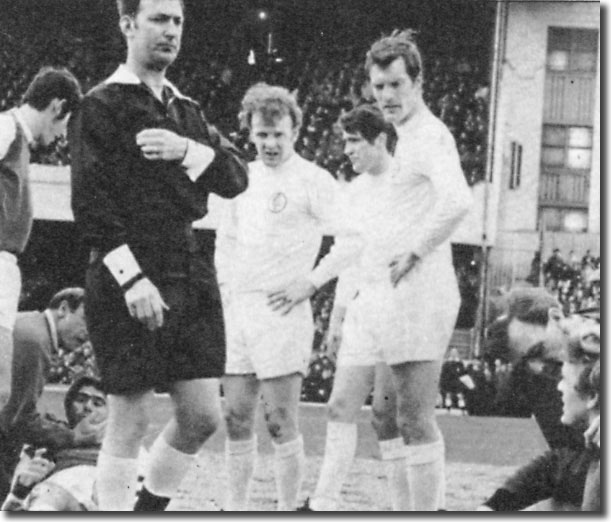 Jones
picked up a long ball out of defence by Bates and left Arsenal defender
Ian Ure standing, going on to slide the ball past goalkeeper Bob Wilson.
Jones
picked up a long ball out of defence by Bates and left Arsenal defender
Ian Ure standing, going on to slide the ball past goalkeeper Bob Wilson.
Johnny Giles sent a drive screaming over the bar as United got on top
but the Gunners equalised in the 34th minute. The Highbury crowd was incensed
when Norman Hunter crashed into David Court, but were cheering minutes
later. George Graham volleyed home from near the penalty spot after a
long free kick by Frank McLintock.
Leeds rapidly restored their lead. Ure passed back wildly to Wilson,
but Giles raced in to pick the ball up near the touchline. He slipped
it past the keeper to leave United 2-1 ahead at the break. There were
no further goals and another valuable two points had been nabbed to keep
the advantage over Liverpool to five.
With Leeds beating Leicester 2-0 and Liverpool hammering Ipswich 4-0
on Saturday 19 April, the two clubs remained as far apart as ever. United
required just four points from three games, though they involved trips
to Anfield and fourth-placed Everton.
The following Tuesday evening saw Leeds at Goodison and Liverpool away
to Coventry.
Confident noises emanated from Elland Road, despite the absence of Mick
Jones, laid low again by flu. Billy Bremner: 'We have come to expect teams
to have a go at us this season when we've gone so long without a defeat,
so tonight will be no different. We're not bothered what Liverpool are
doing. If we keep on winning nobody can catch us.'
On a night crackling with tension, radios were evident amongst both crowds,
eager to keep up with the news from the other ground. Both games reached
the break without a goal to show for some frantic football.
Leeds came close but Giles was too far away to get a touch when goalkeeper
West turned aside Lorimer's shot. Then Everton defenders got in a tangle
and allowed Lorimer to get in and volley across the face of the goal.
back to top
Over at Highfield Road, Liverpool were pressing hard. Within five minutes
Ron Yeats had a header saved after a corner and Chris Lawler's shot from
the rebound was blocked by a Coventry defender. Callaghan hit the City
bar and Alun Evans was denied by the keeper. Coventry's Hannigan had the
ball in the net after 29 minutes, but the goal was disallowed for a foul.
Liverpool fought back to hit the bar.
In the second half, Liverpool's Evans and Coventry centre-half Setters
were dismissed for fighting and the clash took the heat out of the game,
which petered away to a disappointing goalless draw.
Leeds were in more collected mood at Goodison.
Eric Todd in The Guardian: 'Impartial observers ... were generous
in their recognition of this latest example of remorseless all round efficiency.
However, much jealousy - or even hate - which Leeds have generated this
season, nobody with any sense of justice at all could fail to be impressed
by their record … Bremner surely had never been in better fettle. It needed
a great captain to organise his men in the face of redoubtable opposition
and in the presence of a baying crowd which came to harass and to destroy
but which stayed to bestow ungrudging approval.
'For the first 10 minutes of the second half nothing seemed more certain
than that the Leeds defences would give beneath the weight of persistent
pressure by Everton ... Notably, after a long centre from the left by
Harvey, Hunter, standing almost on Sprake's doorstep, allowed the ball
to bounce past him and a surprised Sprake did well to save at the last
second. In the last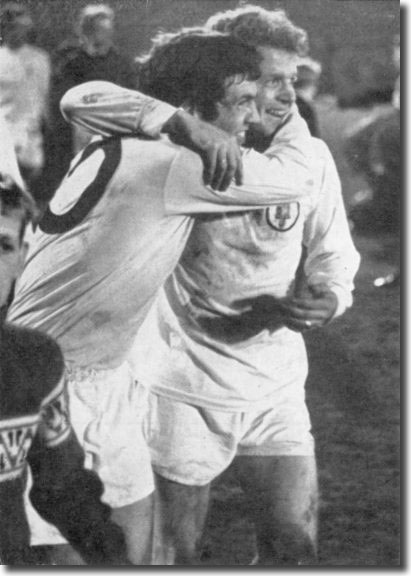 10 minutes Jackson, given an unexpected pass by Gray, turned the ball
over the Leeds crossbar while Husband and Royle also went close before
the end. The manner, the almost insolent manner, in which Leeds ignored
these misses had to be seen to be believed.'
10 minutes Jackson, given an unexpected pass by Gray, turned the ball
over the Leeds crossbar while Husband and Royle also went close before
the end. The manner, the almost insolent manner, in which Leeds ignored
these misses had to be seen to be believed.'
The results left United in a great position. They had two matches left,
on the Monday after the Cup final at Anfield and then two days later at
home to Nottingham Forest. A win or a draw at Liverpool would guarantee
them the title. Even a defeat would mean that United could still secure
the title by beating Forest at home.
That said, Liverpool in their own back yard were fearsome opponents.
Only Forest had come away from Anfield with a win and the Reds had conceded
a meagre ten goals at home all season. It was clear that Bill Shankly
would whip his men up to play like dervishes.
The contest was typical of many between
the sides over the years: fiercely competitive and played at breathtaking
pace. United set their stall out for the clean sheet that they needed.
At times they lived on the edge of their nerves, but they mounted a formidable
white barricade and dared Liverpool to do their worst.
Their worst was never quite enough. Evans had two golden opportunities
to secure the goal that meant so much to Liverpool but missed both. United
emerged unscathed from a terrific struggle and at the end, in an episode
that became the stuff of legend, the players walked up to the Kop, who
acknowledged them as deserving champions.
The championship secured, Revie and United turned their attention to
the final match of the season, two days later at Elland Road against Nottingham
Forest, knowing that a victory would move them on to 67 points, a new
record for the First Division.
For large parts of the game, it was very much a case of 'After the Lord
Mayor's show,' as United struggled to impose any authority. Barry Foster
in the Yorkshire Post: 'From start to finish Leeds attacked as
though their very lives depended upon winning, but Forest broke out of
defence well and might have been two goals in front by the interval. Leeds
were understandably anxious to score goals on this night of nights but
often the back door was sparsely manned and twice before the interval
Baker might have scored. Forest, though hard pressed at times, had the
better of the goalless first half. With only ten minutes gone, Hilley's
through pass found Baker unmarked in the penalty area and it took a daring
save at the centre-forward's feet by Sprake to save the situation. Ten
minutes later the Leeds goalkeeper looked surprised when Baker's shot
bent around him and hit a post.
'The Leeds attack found a more controlled style in the second half and
shots from O'Grady and Jones were well saved. As the minutes ticked by,
however, Leeds became more and more anxious to find the back of the net
but the vital goal just would not come.'
With six minutes left and the match drifting towards a draw, Terry Cooper
moved forward. His shot was mishit but Johnny Giles was in the right place
to bring the ball down over his shoulder and fire it home from 10 yards
to send the crowd wild with excitement. It was only right that the master
schemer should be the one to get the vital goal - he had enjoyed a tremendous
campaign after putting early season injury problems behind him.
Victory brought a fitting end to a glorious season that United's fans
would never ever forget and one that set the record books spinning:
- Most points (67), beat the previous championship best by Arsenal
(1930/31) and Spurs (1960/61) of 66
- Most home points (39)
- Most wins (27)
- Most home wins (18)
- Fewest defeats (2), beating Arsenal's previous best of four in 1930/31
- Unbeaten at home, equalling their own best, set in their 1963/64 Second
Division championship season
- Only 26 goals conceded
- Only 9 of those goals conceded at home
Leeds were the worthiest of champions, a fact underlined by Don Revie's
election as Manager of the Year. The football press were finally united
in their acknowledgement of a great side. Even Derek Wallis, the Mirror
writer who had earlier criticised them, offered praise: 'There has been
no doubt in my mind for two seasons that Leeds are the best equipped of
all the 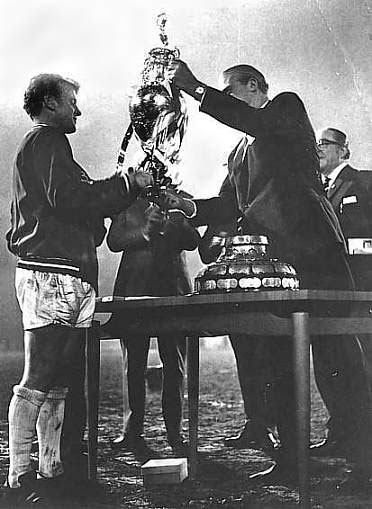 English
teams for the traps, tensions and special demands of the competition they
will now enter - the European Cup. Leeds United are the champions, the
masters, the new kings of English football - at last.'
English
teams for the traps, tensions and special demands of the competition they
will now enter - the European Cup. Leeds United are the champions, the
masters, the new kings of English football - at last.'
A team that had started the decade in such dire straits, stumbling on
the verge of the Third Division, could justifiably claim the accolade
of being the team of the Sixties.
Part 1 - Going for the one - Results
and table
Other Football Highlights from 1968/69
- Manchester City's revival under the managerial partnership of Joe
Mercer and Malcolm Allison continued when they won the FA Cup to add
to 1968's league title and the Second Division championship in 1966
- Sir Matt Busby announced his retirement as Manchester United manager
on 14 January
- There was another giantkilling at Wembley in the League Cup final
when Third Division Swindon Town overturned Arsenal 3-1 after extra-time
on a muddy swamp of a pitch. Winger Don Rogers scored the two decisive
goals
- Geoff Hurst scored six times when West Ham beat Sunderland 8-0 in
October and then admitted his first goal should have been disallowed
for handball
- Jimmy Greaves scored his 200th goal for Tottenham in November
- Despite the assaults Celtic had suffered in the world club championship
in 1968, Matt Busby was determined that Manchester United should try
to win the trophy. Argentina's Estudiantes gave them a roughing up in
the first leg in South America and gained a 1-0 advantage. The second
leg at Old Trafford was a 1-1 draw and thus Estudiantes took the title
- England had a summer tour of South America as preparation for the
World Cup finals there in 1970. They drew with Mexico, before beating
a Mexican XI 4-0 and Uruguay 2-1. They were unlucky to lose 2-1 to a
late winner by Brazil's Jairzinho after taking the lead in their final
match
- In November Jim Gregory, the QPR chairman, sacked Alec Stock, the
manager who had just guided them from Third Division to First. It set
off an astonishing managerial merry go round. Two days later Tommy Docherty
moved from Rotherham to QPR. A fortnight later Ronnie Allen quit Wolves
and Bill McGarry left Ipswich to replace him. The next day Bobby Robson
was sacked at Fulham and Johnny Haynes was appointed player manager.
In December, Nottingham Forest got rid of John Carey and installed Matt
Gillies, who resigned from Leicester. Then Docherty walked out of QPR
after a bust up with Gregory. Haynes packed up the job after four games
and Bill Dodgin took over. The vacant spot at Leicester was taken by
Torquay's Frank O'Farrell. Docherty quickly bounced back to take over
at Aston Villa and Stock re-emerged as boss at Luton
- Celtic won the treble for the second time in three years, winning
the league by five points, beating Hibs 6-2 in the League Cup final
and Rangers 4-0 in the Scottish Cup final
- Newcastle United won the Fairs Cup. They beat Hungarians Ujpest Dozsa
3-0 at home and then triumphed 3-2 in Hungary
- The World Cup qualifying match between Honduras and El Salvador provoked
a full scale war between the two countries. There were two legs followed
by a deciding replay and there was rioting at all three games, which
led to skirmishes along the border between the two countries
back to top












 Part
1 - Going for the one - Results and table
Part
1 - Going for the one - Results and table showed
right from the start ... Crerand, Manchester United's wing-half, was booked
for consecutive trips on O'Grady. The sides shared 33 fouls in the match,
nine above the average.
showed
right from the start ... Crerand, Manchester United's wing-half, was booked
for consecutive trips on O'Grady. The sides shared 33 fouls in the match,
nine above the average. ground limit. It will also take care of the reduction in numbers we are
finding ourselves experiencing on Spion Kop. The old Kop used to take
about 19,000 when full and we had estimated for the new Kop to take nearly
17,000 - but we find that in practice it is full with 14,000 plus.'
ground limit. It will also take care of the reduction in numbers we are
finding ourselves experiencing on Spion Kop. The old Kop used to take
about 19,000 when full and we had estimated for the new Kop to take nearly
17,000 - but we find that in practice it is full with 14,000 plus.' deserved the points.
deserved the points. hand
to head it home.
hand
to head it home. clear
it off the line. The linesman insisted that it had been over the line
and a goal was awarded.
clear
it off the line. The linesman insisted that it had been over the line
and a goal was awarded. the
penalty area. Giles hit a good shot to the right of the goalkeeper, but
a fine save meant the Leeds schemer had missed - only his fourth penalty
in many attempts for the club.
the
penalty area. Giles hit a good shot to the right of the goalkeeper, but
a fine save meant the Leeds schemer had missed - only his fourth penalty
in many attempts for the club. without
Reaney, Charlton and O'Grady, all in bed with flu. Hunter also had a high
temperature, although he travelled and was expected to play. The manager
called up reserves Terry Yorath and Jimmy Lumsden as cover.
without
Reaney, Charlton and O'Grady, all in bed with flu. Hunter also had a high
temperature, although he travelled and was expected to play. The manager
called up reserves Terry Yorath and Jimmy Lumsden as cover. enough
for Leeds. They earned the first of those the following night in a goalless
draw at Sheffield Wednesday.
enough
for Leeds. They earned the first of those the following night in a goalless
draw at Sheffield Wednesday. Jones
picked up a long ball out of defence by Bates and left Arsenal defender
Ian Ure standing, going on to slide the ball past goalkeeper Bob Wilson.
Jones
picked up a long ball out of defence by Bates and left Arsenal defender
Ian Ure standing, going on to slide the ball past goalkeeper Bob Wilson. 10 minutes Jackson, given an unexpected pass by Gray, turned the ball
over the Leeds crossbar while Husband and Royle also went close before
the end. The manner, the almost insolent manner, in which Leeds ignored
these misses had to be seen to be believed.'
10 minutes Jackson, given an unexpected pass by Gray, turned the ball
over the Leeds crossbar while Husband and Royle also went close before
the end. The manner, the almost insolent manner, in which Leeds ignored
these misses had to be seen to be believed.' English
teams for the traps, tensions and special demands of the competition they
will now enter - the European Cup. Leeds United are the champions, the
masters, the new kings of English football - at last.'
English
teams for the traps, tensions and special demands of the competition they
will now enter - the European Cup. Leeds United are the champions, the
masters, the new kings of English football - at last.'